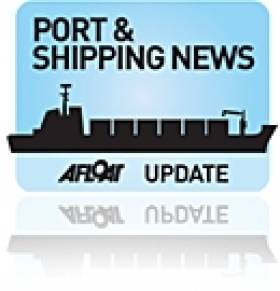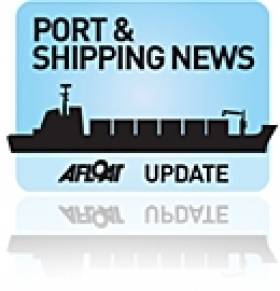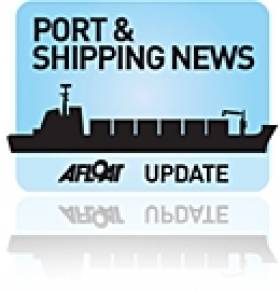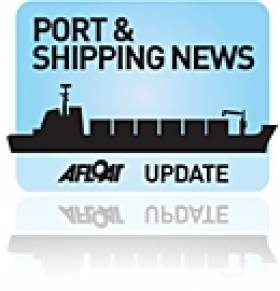Displaying items by tag: Irish Tonnage Tax
#Ports&ShippingReview - Over the last fortnight, Jehan Ashmore has reported on the shipping scene.
Rebecca Wardell, Business Development Manager of the Irish Maritime Development Office (IMDO) addressed the Irish Maritime Law Association's Spring Lecture in a talk titled, 'Understanding the Irish tonnage tax regime'.
Italian international shipowner, D'Amico Group with offices in Dublin, announced delivery of their largest ship to date, the 'Handy-Cape' type vessel Cielo d'Italia.
Drogheda Port Company handled over 1.2m tonnes of cargo in 2014, an increase of 17% on 2013. The port outperformed the Irish port sector in terms of year on year growth for third year running.
The stricken Solent ship, Hoegh Osaka, a vehicle-carrier went to A&P Falmouth for repairs following discharge of vehicles in Southampton after her deliberate grounding on a sandbank last month.
Lysblink Seaways a cargsoship has run aground in Scotland, while en route from Belfast to Norway. The incident took place near Ardnamurchan Point in the West Highlands.
The IMDO released Q3 figures for 2014 that show container shipping volumes, Lo/Lo rose by 9% in Q3. Ro/Ro experienced a 6% growth and Break-Bulk grew by 16%. This is in contrast however to total traffic volumes by Irish ports which fell by 3% overall in Q3, when compared to the same period last year.
IMDO Launch Report on Irish Tonnage Tax Opportunities for International Shipping Industry
#IrishTonnageTax - The Irish Maritime Development Office (IMDO) has released a report Irish Tonnage Tax: Opportunities for the International Shipping Industry.
The Irish tonnage tax regime has been established for over 10 years and offers one of the most competitive on-shore corporate tax rates to international shipping companies.
The tonnage tax report was produced by independent experts PwC and details the benefits of locating a maritime operation in Ireland. The report provides an update on Ireland's extensive double tax treaty network.
Ireland's role is highlighted in its expertise in asset leasing and for having a well developed structured finance regime which can be directly applied to international maritime financing.
The Irish tonnage tax is derived from a 'notional' profit calculated based on the tonnage of a vessel, which is then subject to the Irish corporate tax rate of 12.5%.
The IMDO is the Irish government agency which provides support and advice to Maritime companies setting up operations in Ireland. In his forward to the report, IMDO Director Liam Lacey says 'this publication provides independent validation of Ireland's status as a world class location in which to conduct business and more particularly, sets Ireland apart as a hub for maritime commerce'.
As a country, Ireland continues to maintain its reputation as a pro-business environment that has attracted investment from some of the world's largest companies over the past three decades.
In Forbes' 2014 annual ranking of the Best Countries for Business, Ireland was named number one country in the world for business.
More recently, figures released by the Irish Central Statistics Office (CSO) show that the national economy grew by more than seven times the EU average between April and June 2014. This is the strongest growth rate recorded in Ireland since the early 2000's, showing a strong and stable recovery.
Continuing in this vein, the Irish Economic and Social Research Institute (ERSI) predict that Ireland's GNP is to grow by approximately 5% in 2014 and 5.3% in 2015.
Irish Tonnage Tax: Opportunities for the International Shipping Industry is available to download by clicking HERE
For more information on the report and locating a maritime operation in Ireland, contact Rebecca Wardell by calling +353 (0)1 476 6518 / +353 (0)87 798 0089 or email: [email protected]
Speaking at the ceremony Mr. Murphy commented: "d'Amico Group are one of a leading number of firms that are driving investment in this sector in Ireland which is contributing to new employment and growth opportunities".
Entry of the new dry-bulkers marks another important chapter in the d'Amico Group's development since it established its Irish office in 2002, as the vessels are managed from its Dublin office under the Irish Tonnage Tax (ITT) regime.
Four more newbuilds are under construction in Korea, scheduled for delivery in 2012, and two under construction in Japan which are due in 2013. The latter ships represent a further investment in excess of US $310 million to the Italian company that began and grew as a family business in 1936.
To read more about this logon to the IMDO website and also www.damicoship.com
The act is designed to assist in securing the future of the Irish shipping sector in which five new companies in 2010 entered the scheme, generating an increase of 44% in the number of vessels (from 154 to 177) covered by the Tonnage Tax. Half of these vessels range less than five years old with the total average age at eight years.
In addition the initiative has directly created 314 jobs in 2009 to nearly 350 jobs last year. Most of the employment is in specialised areas such finance,technical management, operations and chartering.
Commenting on the data, IMDO Director Glenn Murphy said "The results are a positive indication that after long periods of decline for the industry that policy support measures have encouraged investment which has led to growth and new employment. We are optimistic that direct employment
in the high value professional shipping services sector could double over the next five years leading to further investment and job creation opportunities"
The majority of Irish-based ship-owning firms operating within the ITT scheme are not entirely reliant on the Irish economy for their daily core revenue streams but are instead employed in the international shipping markets.
In 2010 the global shipping business had total charter trading transactions estimated at $450 billion dollars. It was a year in which the shipping markets continued to be quite volatile with most sectors still recovering from large charter earnings declines over the previous 12 months. Overall Irish firms were quite resilient in their ability to compete last year.
The growth in this sector in Ireland has been driven by established Irish-owned companies Arklow Shipping Ltd (ASL) and the Mainport Group and inward investment has come from D'Amico and Ardmore Shipping. The chemical and products tanker fleet operator located its headquarters to Cork last year and the company is backed by a large US private equity firm.
To read more from the report, you can request a copy by contacting the IMDO by e-mailing [email protected]
































































